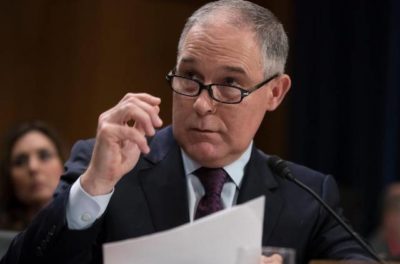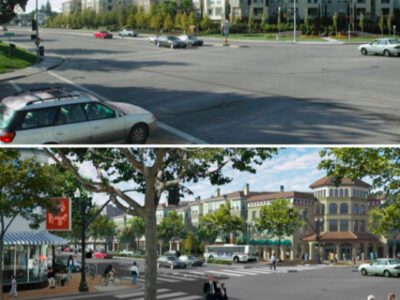Scott Pruitt, Senator Harris and the California Question
California leadership in peril?
 Scott Pruitt, Donald Trump’s nominee to head the Environmental Protection Agency, elided many questions yesterday and made some somewhat surprising commitments to appease Senate Democrats in response to others (acknowledging that humans are at least partially responsible for climate change; saying he’ll use the Clean Air Act to regulate greenhouse gases). But his response to California Senator Kamala Harris’s question about California’s special authority to regulate vehicle emissions under the Clean Air Act was disturbing and unsettling. Undermining the state’s emissions authority could cripple the state’s efforts to clean up its air and to tackle climate pollution. Here’s the exchange between Harris and Pruitt:
Scott Pruitt, Donald Trump’s nominee to head the Environmental Protection Agency, elided many questions yesterday and made some somewhat surprising commitments to appease Senate Democrats in response to others (acknowledging that humans are at least partially responsible for climate change; saying he’ll use the Clean Air Act to regulate greenhouse gases). But his response to California Senator Kamala Harris’s question about California’s special authority to regulate vehicle emissions under the Clean Air Act was disturbing and unsettling. Undermining the state’s emissions authority could cripple the state’s efforts to clean up its air and to tackle climate pollution. Here’s the exchange between Harris and Pruitt:
Harris: You are familiar with the Clean Air Act? Yes?
Pruitt: I am.
Harris: And as you may know, Section 209(b) of the Clean air Act recognizes California’s authority to issue air pollution standards for new motor vehicles that go above and beyond the federal standard. And EPA has historically recognized California’s authority to issue new motor vehicle pollution standards that go above federal standards.
Will you commit then to upholding that same standard, to recognizing California’s authority to issue its own new motor vehicle air pollution standards?
Pruit: You know, Senator, as you indicated, California was actually regulating before EPA was even created, which is why the California waiver exists under statute––
Harris: Do you agree to uphold that same standard that has been held by your previous administrators?
Pruitt: I agree to review that as each administrator before me has. It has been granted at times and––
Harris: Do you agree to uphold it? Reviewing and upholding are two different points.
Pruitt: Senator, as you know, administrators in the past have not granted the waiver, and in fact have granted the waiver — that’s a review process that would be conducted ––
Harris: What is your intention, sir?
Pruitt: I don’t know that, without going through the process to determine that, Senator, and would not want to presume the outcome.
Senator Harris and Administrator-nominee Pruitt clearly know that California’s leadership in regulating air pollutants from automobiles has led not only to dramatic reductions in conventional air pollution but also to the world’s first greenhouse gas emissions standards for cars. The state has had special authority to regulate such emissions under the Clean Air Act since the mid-1960s even though every other state is preempted from issuing standards. Importantly, California can’t exercise its authority unless EPA issues the state a waiver from the preemption provision. With one exception California has repeatedly been granted waivers — by Republican and Democratic presidents — to clean up its air. And it is absolutely clear that without the special Clean Air Act authority, California simply would not have made the strides we have made in cleaning up our air pollution, especially in southern California.
Moreover, without the state’s special authority, it is doubtful whether the U.S. would have adopted national greenhouse gas standards for cars shortly after President Obama took office in early 2009. That’s because California had developed a set of standards during the George W. Bush Administration when he refused to issue federal standards. Though Bush’s EPA denied California’s waiver to issue the standards (the only denial in the provision’s history), President Obama granted the waiver and then adopted what were essentially the California standards and applied them nationwide. The California standards were, in other words, “shovel ready” for federal adoption.
So what is Pruitt’s motivation in hedging on California’s waiver authority? Why undermine what has been one of environmental law’s great success stories, and one that seems to respect Pruitt’s commitment to states’ rights? To state the obvious, Pruitt may be motivated by the fact that the California provision has worked so well. But more directly, my best guess is that he is motivated by California’s role in motor vehicle greenhouse gas emissions standards. Here’s why.
The Obama Administration has issued a series of standards designed to reduce carbon emissions from various categories of vehicles. The 2017-25 standards for passenger vehicles are the most stringent, requiring manufacturers to meet average fuel economy standards of 54.5 miles per gallon by 2025 (there is a direct correlation between fuel economy and the amount of carbon emitted from a vehicle). These standards were issued jointly with California, and California supported them and agreed not to issue its own standards as long as the federal standards were implemented. Included within the standards was a mid-term review that required California and the federal government to review the standards several years after they were adopted in order to see if the auto companies could comply with them. The so-called mid-term review has been completed and finalized, concluding that the car companies will be able to meet the standards. Just last week, EPA Administrator Gina McCarthy finalized the 2017-25 standards.
The Trump Administration may try to undo the standards. According to the LA Times, a Trump transition advisor said shortly after the election that the new administration would review the standards and auto manufacturers have lobbied the administration to do so. Now that the standards are finalized, repealing them would not be easy and would be time-consuming, a problem for manufacturers, who require a long lead time to comply with regulatory requirements. Nevertheless, the administration could certainly repeal the rule or modify it for later model years to make it less stringent. But if the federal government were to do so, California could step in and issue its own regulations, either the same as those already adopted by the federal government or even more stringent ones. Other states are allowed under the Clean Air Act to adopt the California standards so a good portion of the country could go its own way and continue with the stringent standards. And California already has a waiver to do so — EPA issued the state a waiver in 2013 for the 2017-25 standards. This is where the Harris-Pruitt conversation becomes relevant. He may be signaling to her that EPA will not only look at rolling back the 2017-25 standards but also at rescinding the California waiver.
But there’s even more, potentially, to the Harris-Pruitt colloquy. As I said earlier, standards for auto emissions require a long lead time. California’s legislation to set the first greenhouse gas standards passed in 2002 but were first supposed to be applied to cars manufactured for the 2009 model year (and because of EPA’s waiver denial and subsequent litigation didn’t actually end up applying until the 2012 model year when the federal government extended the standards nationwide). That means that EPA and California should be gearing up soon for a new round of standards for model years 2026 and beyond if we’re to continue to make strides in reducing transportation sector greenhouse gas emissions. It seems safe to bet that the Trump Administration will not lead the charge to do so. California will be left to lead the way. It can’t regulate vehicle emissions without a waiver, however. And Scott Pruitt is signaling that he will not grant such a waiver.
Reader Comments
2 Replies to “Scott Pruitt, Senator Harris and the California Question”
Comments are closed.







Scott Pruitt revealed a lot of concerning information indicating what a U.S. EPA may look like under his direction, but as you note this point was one of the more questionable positions (or lack thereof). Hopefully, after a careful review of the history and science behind California’s extremely successful vehicle standards, Mr. Pruitt will not roll back the standards nor rescind California’s waiver.
California’s standards, which as you note have been adopted by a number of other states and serve as the foundation for the federal standards, have been very successful at reducing pollution and the emission of GHGs, which as we know from basic science and the more complicated science confirmed by the majority of climate scientists, are one of the leading causes of human-induced climate change.
Although his confirmation hearing did not provide much evidence to have faith Mr. Pruitt will commit to making fact-based decisions regarding the climate, I like to be optimistic and, if he is confirmed, hope he will use good science to guide good policy for all Americans and the world.
To play the devil’s advocate (truly), one could also look at what Mr. Pruitt said as not disturbing but simply neutral and perhaps even prudent. Each time California applies for a waiver for a new or modified motor vehicle emission regulation, the EPA has to initiate a public process to take comment. The Administrator then has to decide whether to grant a waiver based on the criteria in the statute and the full record including California’s submittal and all comments. He (or she) cannot prejudge the outcome of that process just like any other public official rendering a decision following a notice and comment process. Senator Harris’s question was not a model of clarity but seemed to be asking Mr. Pruitt to give a commitment now that as Administrator he will grant waivers in the future. That would not be a wise thing for him to say. He can only look at each waiver request as it comes in and then make his decision after a review of the full record following the notice and comment process. Mr. Pruitt does seem to overstate that past “administrators” have sometimes denied waiver requests. There is just one denial from just one administrator and that was later reconsidered and reversed – so query if that still counts as a denial. In any event, better questioning might have elicited more revealing information than just a commitment to follow the basic principles of administrative law.